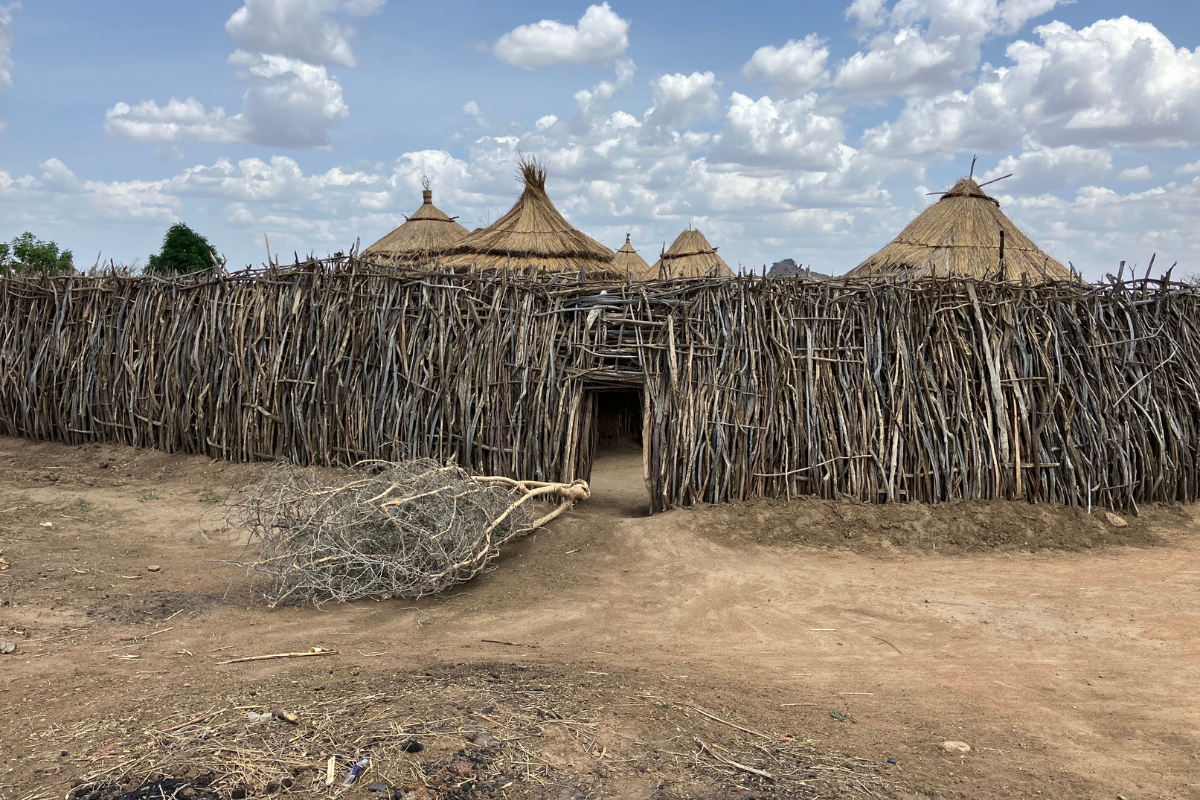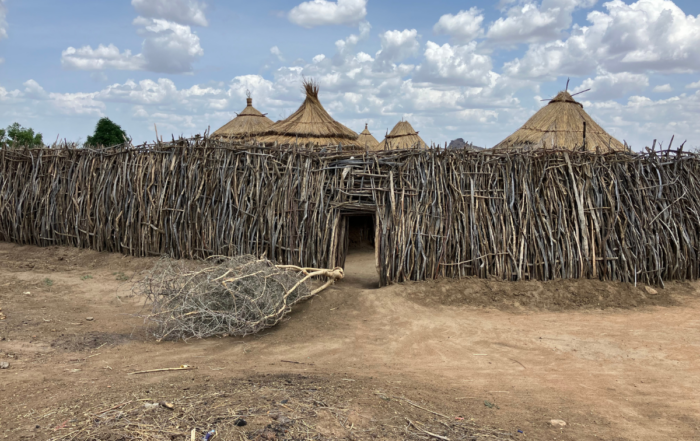A celebration of change in Uganda
April 7, 2024
By Jeff Adams
A celebration of change in Uganda
April 7, 2024
By Jeff Adams

An elder lay in the dirt, too weak to stand, while a young woman fed him tiny scraps from a wooden bowl. Although this was just a scene from a short play, the actors were illustrating what actually happened in Uganda’s remote, sun-parched Karamoja region in 2022-2023.
Back then, people in Karamoja couldn’t grow enough food for themselves due to a severe drought. When their pleas for government help generated only a partial response, they appealed to aid organizations. World Renew answered the call and, with and through local and international partners, organized several distributions of emergency food.
One of the communities in which a distribution occurred was Kokuwam, where the play was performed. The elder, after being energized by the arrival of emergency food, rose to his feet and joined a group of dancing young adults in celebration. But the painful reality is that throughout the Karamoja region, 964 people – including some in Kokuwam – died from starvation in 2022.
Despite the tragedy, Kokuwam’s residents were joyful when they learned a small delegation from World Renew and our partner organization in Uganda, the Pentecostal Assemblies of God (PAG), would visit. On this hot, sunny day, they treated the guests to singing, dancing, and the dramatic presentation, all under the protective shade of a tamarind tree.
“Some of our people died of hunger,” a community spokesman said. “Thank you for coming and bringing food. The rest of us would not have survived without it.”
The food distribution convinced World Renew to work with PAG to ensure the people of Kokuwam and other villages in the region will build greater resilience for when the next drought inevitably occurs.
Supporting mothers and their families with healthy resources
World Renew has partnered with PAG to launch the Kotido Child Survival Project, a Maternal and Child Health project that also includes elements of Peace and Justice, Food Security, and Economic Development programming. All the elements are combining to dramatically improve the health of pregnant women and their newborns during the critically important first 1,000 days (from conception to two years old) of life.
In response to World Renew’s invitation, 450 households in 20 villages in the Kotido district have signed up to participate. Each household has an average of seven children and adults, so 3,150 people will benefit directly, with an estimated 1,350 more indirectly benefitting through the knowledge they gain from their participating neighbours.
The households – most of whom include expectant mothers – are starting communal gardens in which they will grow nutritious crops including carrots, eggplant, cassava, traditional vegetables, and amaranth grain. These varieties are healthy, fast-growing, and drought resistant. Volunteers will be trained as community resource specialists to teach good agricultural practices.
Improving nutrition through community gardens
Agriculture is not a traditional occupation for people in Karamoja. For generations, they raised cattle and other livestock. But when armed gangs began terrorizing communities several years ago, everyone had to adapt. Most households erected stockades around their homes to protect themselves, but that hasn’t stopped the gangs from stealing their livestock and leaving them with no income source.
Large communal gardens are a welcome option, especially ones featuring highly nutritious vegetables. In Karamoja, improved nutrition will mean improved health for mothers and their children, enabling them to be much more resilient if food shortages occur again. Research shows that malnutrition in a child’s first two years can cause profound long-term harm, including “stunting” (failure to reach physical growth potential) and slow mental development.
Participating families will feed themselves through the gardens while also generating valuable income from the surplus produce. That income can purchase other food, medicine, and more household items. It can also cover transportation costs to ensure women visit their local medical clinic regularly during pregnancy, and after birth with their babies for vaccinations and other medical care.
Each household will also be given seedlings to grow moringa trees. Moringa is a particularly useful tree as its seeds can be used to purify water, its leaves help lactating mothers, and it matures from a seedling in only 8-9 months.
Preparing for a healthy future
The project also recruits and trains volunteer Village Health Teams (made up equally of men and women) and Mother Care Groups that encourage clinic visits, breast-feeding rather than costly formulas, vaccinations, and protecting water sources against contamination.
“We want to empower women to take charge of their own health and their children’s health,” said Raymond Mutava, World Renew’s Uganda Country Director.
He noted the project includes a component that is challenging gender roles in a region where women traditionally do all the cooking, cleaning, water gathering, and much more: even gathering tree branches and building the protective stockades.
During a tour of the community, the World Renew and PAG guests talked to some young men doing something unprecedented: sweating profusely in the 36-degree Celsius heat to prepare the soil of their communal garden for seeding.
“We used to see this as women’s work,” said one man, Michael, who also acknowledged that during his wife’s previous two pregnancies, he never encouraged her – let alone accompanied her – to visit the medical clinic. “My thoughts have changed,” Michael told us.
Back at the community celebration – after the acting, dancing, singing, and prayers had come to an end – 26-year-old Rosemary, who was less than a month from giving birth to her third child, stood in front of about 300 people and told the World Renew and PAG visitors: “We really welcome you to our community. You have brought us valuable lessons” about farming, nutrition, maternal and child health – and gender.
“Our husbands used to just lie under the trees while we worked,” Rosemary added with a smile. “Now they are helping us.”
Jeff Adams is Vice-President of World Renew Canada’s board of directors.
An elder lay in the dirt, too weak to stand, while a young woman fed him tiny scraps from a wooden bowl. Although this was just a scene from a short play, the actors were illustrating what actually happened in Uganda’s remote, sun-parched Karamoja region in 2022-2023.
Back then, people in Karamoja couldn’t grow enough food for themselves due to a severe drought. When their pleas for government help generated only a partial response, they appealed to aid organizations. World Renew answered the call and, with and through local and international partners, organized several distributions of emergency food.
One of the communities in which a distribution occurred was Kokuwam, where the play was performed. The elder, after being energized by the arrival of emergency food, rose to his feet and joined a group of dancing young adults in celebration. But the painful reality is that throughout the Karamoja region, 964 people – including some in Kokuwam – died from starvation in 2022.
Despite the tragedy, Kokuwam’s residents were joyful when they learned a small delegation from World Renew and our partner organization in Uganda, the Pentecostal Assemblies of God (PAG), would visit. On this hot, sunny day, they treated the guests to singing, dancing, and the dramatic presentation, all under the protective shade of a tamarind tree.
“Some of our people died of hunger,” a community spokesman said. “Thank you for coming and bringing food. The rest of us would not have survived without it.”
The food distribution convinced World Renew to work with PAG to ensure the people of Kokuwam and other villages in the region will build greater resilience for when the next drought inevitably occurs.
Supporting mothers and their families with healthy resources
World Renew has partnered with PAG to launch the Kotido Child Survival Project, a Maternal and Child Health project that also includes elements of Peace and Justice, Food Security, and Economic Development programming. All the elements are combining to dramatically improve the health of pregnant women and their newborns during the critically important first 1,000 days (from conception to two years old) of life.
In response to World Renew’s invitation, 450 households in 20 villages in the Kotido district have signed up to participate. Each household has an average of seven children and adults, so 3,150 people will benefit directly, with an estimated 1,350 more indirectly benefitting through the knowledge they gain from their participating neighbours.
The households – most of whom include expectant mothers – are starting communal gardens in which they will grow nutritious crops including carrots, eggplant, cassava, traditional vegetables, and amaranth grain. These varieties are healthy, fast-growing, and drought resistant. Volunteers will be trained as community resource specialists to teach good agricultural practices.
Improving nutrition through community gardens
Agriculture is not a traditional occupation for people in Karamoja. For generations, they raised cattle and other livestock. But when armed gangs began terrorizing communities several years ago, everyone had to adapt. Most households erected stockades around their homes to protect themselves, but that hasn’t stopped the gangs from stealing their livestock and leaving them with no income source.
Large communal gardens are a welcome option, especially ones featuring highly nutritious vegetables. In Karamoja, improved nutrition will mean improved health for mothers and their children, enabling them to be much more resilient if food shortages occur again. Research shows that malnutrition in a child’s first two years can cause profound long-term harm, including “stunting” (failure to reach physical growth potential) and slow mental development.
Participating families will feed themselves through the gardens while also generating valuable income from the surplus produce. That income can purchase other food, medicine, and more household items. It can also cover transportation costs to ensure women visit their local medical clinic regularly during pregnancy, and after birth with their babies for vaccinations and other medical care.
Each household will also be given seedlings to grow moringa trees. Moringa is a particularly useful tree as its seeds can be used to purify water, its leaves help lactating mothers, and it matures from a seedling in only 8-9 months.
Preparing for a healthy future
The project also recruits and trains volunteer Village Health Teams (made up equally of men and women) and Mother Care Groups that encourage clinic visits, breast-feeding rather than costly formulas, vaccinations, and protecting water sources against contamination.
“We want to empower women to take charge of their own health and their children’s health,” said Raymond Mutava, World Renew’s Uganda Country Director.
He noted the project includes a component that is challenging gender roles in a region where women traditionally do all the cooking, cleaning, water gathering, and much more: even gathering tree branches and building the protective stockades.
During a tour of the community, the World Renew and PAG guests talked to some young men doing something unprecedented: sweating profusely in the 36-degree Celsius heat to prepare the soil of their communal garden for seeding.
“We used to see this as women’s work,” said one man, Michael, who also acknowledged that during his wife’s previous two pregnancies, he never encouraged her – let alone accompanied her – to visit the medical clinic. “My thoughts have changed,” Michael told us.
Back at the community celebration – after the acting, dancing, singing, and prayers had come to an end – 26-year-old Rosemary, who was less than a month from giving birth to her third child, stood in front of about 300 people and told the World Renew and PAG visitors: “We really welcome you to our community. You have brought us valuable lessons” about farming, nutrition, maternal and child health – and gender.
“Our husbands used to just lie under the trees while we worked,” Rosemary added with a smile. “Now they are helping us.”
Jeff Adams is Vice-President of World Renew Canada’s board of directors.
The post Uganda: A celebration of change appeared first on World Renew.


